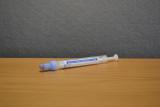Test Directory
Kleihauer
Containers - Adult

Blue Cap 4.5ml Sarstedt
|
Volume Range
4.5ml
Additive per Container
EDTA |
Containers - Child

Blue Cap 4.5ml Sarstedt
|
Volume Range
4.5mL
Additive per Container
EDTA |
Reference ranges
The presence of foetal red cells in the maternal circulation indicates the occurrance of a feto-Maternal-Haemorrhage (FMH).
FMH results are expressed in mLs
Laboratory Site
Howden
Livingston
West Lothian
EH54 6PP
Transport arrangements
Sample storage arrangements
Special instructions for collection
If part of an Rh programme / Suitability testing, the maternal sample should be taken after a period of 40 minutes post delivery to allow the feotal red cells to be fully distributed within the maternal circulation. If a Group and Save is also required, two maternal samples must be sent as the sample intended for Kleihauer testing cannot be centrifuged.
NHS Lothian operates a Zero Tolerance approach in relation to blood sample acceptance criteria. Errors in patient identification and sample labelling may lead to ABO-incompatible transfusions.
The demographics on the samples MUST be hand written, legible and MUST match exactly to the accompanying request form. Samples labelled with an addressograph or where evidence of an addressograph have been attached will be discarded. Samples with errors or where patient core identifiers have been obliterated will be discarded.
Sample Labelling
The following patient identifying data and sampler signature is mandatory -
- CHI number (or Hospital Number where no CHI number is available - See CHI exceptions)*
- Surname
- Forename
- Date of Birth
- Signature
Sample Labelling for Unknown Patients
- Surname / Forename = UNKNOWN
- Temporary Identification Number = beginning with 700
- Gender
- Sample dated and signed
Once patients details become known, a new sample must be sent to the laboratory
Request Form Labelling
Addressograph labels are acceptable for request forms. If the form is handwritten then the information must be clear, legible and MUST contain the following data identifiers -
- Surname
- Forename
- Date of Birth
- CHI Number (See CHI exceptions)*
- Name and signature of the person taking the sample
- Name of the requesting clinician. (For component requests, this is the Doctor or authorised Nurse that has prescribed the transfusion)
- Clinical details are desirable but are not essential
*CHI Exceptions
Not all patients will have a CHI number. If the patient is a genuine CHI exception then the Hospital number is acceptable and MUST be used. A CHI number may not be available in the following circumstances -
- Foreign visitors
- Patients from England, Wales and Ireland
- Patients not registered with a GP in Scotland
- Patients currently remanded within Her Majesty's Prisons
- Patients in the armed forces
- Newborn infants <3 days old.
A MINIMUM of 2.0ml of blood is required for adult specimens. For paediatric patients, please refer to the link below for specimen types and volume ranges.
How to request
Electronic ordering is not available for Blood Transfusion tests. All tests are ordered via request form which must then be sent to the laboratory along with the appropriate sample(s).
Request forms can be obtained from the Blood Transfusion Laboratory.
Availability
Tests can be received 24/7 into the blood sciences / Blood Transfusion laboratory
Anticipated turnaround
What happens if the result is positive or abnormal
The amount of Anti-D Immunoglobulin required post FMH is dependant upon the volume of foetal red cells determined to be present in the maternal circulation. The number of foetal and maternal cells are counted and reported as < or > 2mls.
FMH of >2mL are forwarded to SNBTS Gartnavel for confirmation by Flow Cytometry. If the FMH is >4.0mL, a second sample will be requested at 72 hours post IM administration of Anti-D Immunoglobulin or 48 hours post IV administration.
General additional information
False positive results may be obtained where a woman has a high level of foetal haemoglobin (HbF).
Decisions made regarding the dosage of Anti-D Ig required in cases of massive Feto-Maternal Haemorrhage should be made once the result has been confirmed by Flow Cytometry.
Seperate samples should be received for maternal blood grouping / antibody screening and Kleihauer testing.